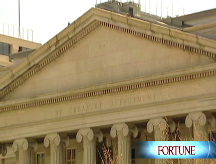Citi splitting into two after $8.3 billion loss
Results come in far worse than analysts were anticipating; banking giant will realign into two units, ending its so-called 'universal banking' business model.
 |
| Citigroup confirmed market speculation Friday, moving to break its massive business into two parts. |

NEW YORK (CNNMoney.com) -- Citigroup reported a much bigger-than-expected $8.3 billion quarterly loss Friday, while the beleaguered banking icon also revealed plans to split up into two businesses, effectively bringing an end to the company's "financial supermarket" model.
Under the new arrangement, Citigroup would split itself into two units: Citicorp and Citi Holdings. The more stable Citicorp would house, among other things, the company's private and investment bank as well as its credit card and consumer banking business, with about $1.1 trillion in assets.
The smaller Citi Holdings would incorporate its so-called non-core businesses, including its Smith Barney brokerage and a pool of troubled assets that have plagued the firm for more than a year.
The Citi Holdings division would also include the $301 billion in assets that the government agreed to backstop against future losses as part of a massive rescue package plan unveiled for Citigroup in November. In addition to this guarantee, the government has also injected $45 billion into the company in exchange for preferred shares.
CEO Vikram Pandit said the difficult economic and market environment for both Citigroup and the broader banking sector forced the company's hand, adding that the move will help simplify the organization and help better serve both clients and customers.
"The realignment will preserve what makes Citi unique -- its global, universal banking footprint," he said in a statement. "We will continue to move aggressively to get Citi back on the right track and return it to a position of sustainable financial success."
Citigroup (C, Fortune 500) stock, which lost 43% of its value over the past week before the restructuring news amid concerns about its future, fell another 9% Friday.
By splitting up the firm, Citigroup would effectively take on a so-called "good bank-bad bank" structure.
Citicorp would serve as the "good bank," housing Citigroup's most reliable businesses. Citi Holdings, on the other hand, would become the "bad bank", overseeing not only the firm's troubled securities, but its consumer financial loan portfolios as well, including student loans and mortgages.
At a time when Citigroup has faced so many questions about its underlying health, some analysts said Friday's restructuring was not only done to provide greater transparency to investors, but get the firm ready to sell some of its businesses.
"Isolating badly-performing units and moving towards a more streamlined and manageable structure gives Citi a new shot at the game," said Isabel Schauerte, an analyst with Celent, a Boston-based financial research and consulting firm.
Pandit said during a conference call with investors Friday that the bank would work to implement the restructuring changes as quickly as possible, but that it was not in a rush to sell some of the Citi Holdings units. Analysts have speculated in recent months that the company may look to sell additional divisions in an effort to raise cash.
Certainly Citigroup's dramatic facelift would effectively reverse the 1998 merger between Citicorp and Travelers Group overseen by then-CEO Sanford Weill.
That deal created the modern-day Citigroup and its so-called "universal bank" approach, which aimed to offer clients and customers a smorgasbord of financial services.
For years, the model was roundly criticized by both shareholders because they believed it did not work. Pandit had reaffirmed his commitment to the business model in recent months, but that appeared to change after the government stepped in to rescue the financial services giant in November.
Still, some analysts were skeptical whether Citigroup was out of the woods following its latest move.
"There are a lot of things they still have to worry about," noted Jason Tyler, a senior vice-president at the Chicago-based Ariel Investments, citing signs of deterioration in the company's credit card portfolio in the latest quarter.
Those troubles helped contribute to Citigroup's latest loss.
The New York City-based bank said it lost $8.29 billion, or $1.72 a share, during the fourth quarter, representing the company's fifth-straight quarterly loss. The bank lost a total of $18.72 billion in 2008.
Hoping to silence market speculation about its underlying health, Citigroup moved up Friday's report. Still, the numbers were far worse than Wall Street was anticipating. Analysts were expecting the New York City-based bank to record a loss of $4.49 billion, or $1.31 a share.
"Our results continued to be depressed by an unprecedented dislocation in capital markets and a weak economy," said Pandit.
Citigroup was once again hammered by substantial writedowns on its portfolio of mortgage-related securities. The firm also recorded losses on some private equity investments, and its investment banking business took a hit as capital markets activity remained at a standstill during the final three months of 2008.
The bank also increased its loan loss reserves by $6 billion during the quarter, a sign that the company is bracing for future loan losses.
Helping to offset those losses was a one-time gain of $3.9 billion from the sale of the company's German retail banking business during the quarter.
The results cap another tumultuous week for Citi and the broader banking sector. Citi's breakup announcement was widely expected after the bank announced on Tuesday that it was selling a majority stake in Smith Barney to Morgan Stanley (MS, Fortune 500) for $2.7 billion.
Last week, long-time board member Robert Rubin stepped down following scrutiny about his failure to stop the company from ramping up its risk exposure.
Late Thursday, the federal government moved to inject another $20 billion into rival Bank of America (BAC, Fortune 500), in addition to guaranteeing $118 billion in assets, to help the company complete its purchase of Merrill Lynch.
The Charlotte, N.C.-based firm followed that up by reporting a quarterly loss of $1.8 billion before the opening bell Friday. ![]()


